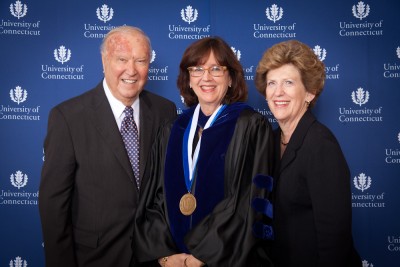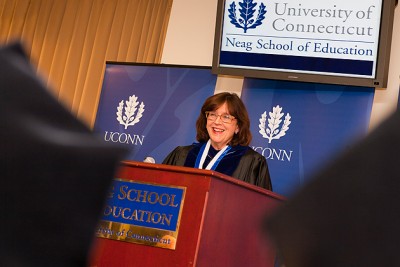
Sally M. Reis, nationally known for working with academically talented and high potential students, and noted as the principal investigator for the National Research Center on the Gifted and Talented, has been named the first to hold the new Letitia Neag Morgan Chair for Educational Psychology.
The endowed chair was established in honor of Reis’ mother, who passed away in October 2010. It was created by Ray and Carole Neag, generous supporters to the Neag School of Education at UConn. Letitia Neag Morgan was Ray’s sister.
During the recent Investiture Ceremony to bestow the chair, Dr. Reis spoke of the gratitude and kindness upon which she has tried to build her adult life. Numerous family members, friends and colleagues enthusiastically attended the ceremony to show their gratitude and appreciation toward Reis.
“I grew up in a home with a mother who loved all six of her children unequivocally,” Reis remarked. “Through the generosity of my wonderful uncle and aunt, Ray and Carole Neag, to know that my mother’s name will endure in this chair brings such joy to all of our family.”
She spoke about the gratitude toward other family members who taught her the value of family and love and colleagues who have supported her along the way.
“Gratitude for my work has also been a guiding principle in my life,” she said. “There were and have been days that I looked at a pile on my desk and wondered how I could finish what I needed to do that day, and I have found simply being grateful for meaningful work to carry the day.”
“I am a teacher at heart. I have loved my work from the day I started teaching but I especially love doing what that I believe in most—helping children with talents as well as students with special needs.”
Dr. Reis is a distinguished scholar of the National Association for Gifted Children and a fellow of the American Psychological Association, two of the highest honors given in her field. She is also a teaching fellow and Board of Trustees distinguished professor at UConn.
In his recommendation to the Board of Trustees that Reis be appointed to the chair, UConn Provost Peter J. Nicholls wrote, “Dr. Sally M. Reis is an internationally recognized scholar and a champion of students of special needs, ranging from those with learning disabilities to gifted and talented students.”
During the ceremony, Dean Tom DeFranco praised her achievements, “If Sally was measured on her professional accomplishments alone (scholarly production) she would be a giant in the field. However, academicians recognize that our legacy is not built solely on our scholarly reputation but also on the impact and influence we have on our students.”
“Over the years, Sally has built a legacy of being a good steward to the profession as well as a caring mentor to her students,” said DeFranco.
As noted by one of Sally’s former Ph.D. students, “Rarely does a day pass that I do not think about Sally and her profound influence upon my life and the lives of others. I am acutely aware that I hold my position today largely due to Sally’s mentoring, modeling, teaching, and friendship and the outstanding education she afforded me at UConn. I remember how Sally took care of her graduate students, and I try to pay it forward in true Sally Reis style.”
“Sally is one of the giants in our field, her scholarship is far-reaching, and her influence is profound. At the same time, she is gracious, kind, generous, and caring—a confluence of traits that make her truly one-of-a-kind, and someone everyone respects and admires.”

When asked how the new chair will make an impact on her work, Reis responded, “I hope to use the chair to continue my research on children of poverty and from working class families, those with disabilities and those with talents that are not often recognized by their teachers.”
“This award verifies the work that I have done in the past and will support my work in the future,” she continued. “The endowed chair means that I will have additional funds and additional time in the future to seek out opportunities to positively affect the lives of children of poverty and high potential.”
Reis completed her Ph.D. in educational psychology of the gifted and talented in 1981 at the Neag School and she fell in love with the academic area in which she did her work. After she graduated, she returned to her school district to work in administration for the next seven years. Then a position opened up back at her Alma mater, and she hasn’t looked back since.
Reis describes her mission as one focused on children with academic gifts and talents who are not well served in the United States right now. “It’s a deplorable situation in many high-poverty, urban and rural areas, where it’s common for a first-grader who reads at a fifth-grade level to leave fifth grade reading at a fifth-grade level. So much attention is paid to the students who achieve at the very lower levels, and minimal attention [is given] to children at higher levels.”
Reis sees this as a terrible direction for education and a terrible loss for the country. With the work she’s done with the National Research Center on the Gifted and Talented, she’s been able to focus on that loss and turn the attention toward academically talented children from high-poverty groups.
“I’m productive because it’s my passion, because I believe in what we do,” she said. “Because I work with wonderful people, and because I’m supported by a community of scholars who agree with me and who have given me every opportunity to be successful and be productive.”
In creating the chair, the Neags sought to pay tribute to the importance Letitia Neag Morgan placed on education and to reward significant contributions in the field of psychology.
“Our focus is UConn,” said Ray Neag, “and in thinking about what to do with some of our good fortune, we thought that because education was so important to Letitia, wouldn’t this be a nice way to honor her?”
Reis says with gratitude to her uncle and his wife, Carole, “That the chair is named for my mother is a special joy to my entire family.”
In her new role, Reis plans to share the pedagogy of gifted education with more students, to enable more schools like the Renzulli Academy for Gifted and Talented to serve high-potential learners from high-poverty families, and to help more educators focus on students’ strengths and interests as opposed to their deficits.
“I am a very grateful person,” said Reis. “I am fortunate to work with wonderful colleagues and staff, have the support of a marvelous dean, and am very fortunate to have found work that I love and continue to love.”
“I commit myself to be worthy of this chair—to extend the work that I do for the good of children to the greater vision of the University of Connecticut,” concluded Reis.
The Neag School of Education, along with the education community, is grateful to have Reis advocating for children and is grateful to the Neags for their generous support for this important chair.
 Facebook
Facebook
 Twitter
Twitter
 LinkedIn
LinkedIn
